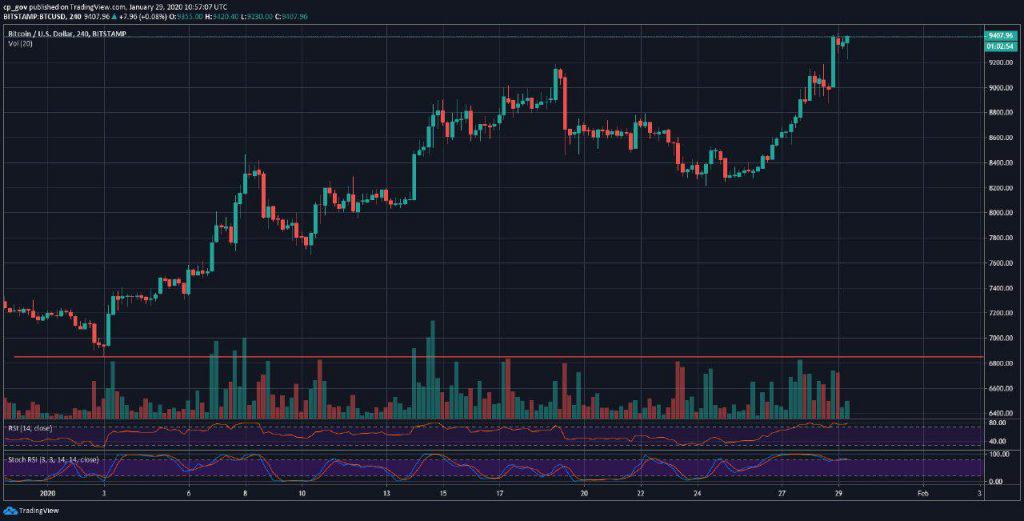2020 has so far been an exciting and profitable year for Bitcoin. Since the early days of January, the cryptocurrency has managed to increase its value by almost 40%. This is a spectacular performance for any asset, even more so within traditional markets.

BTC/USD January. Source: TradingView
In the past 24 hours alone, Bitcoin is up more than 3%, looking primed to start testing the resistance line at around $9,400.
With so much going on in terms of price action, it’s perhaps interesting to outline a few reasons for which Bitcoin’s price is surging so far in January.
Bitcoin Halving Is Just Around The Corner
The Bitcoin halving is one of the most highly-anticipated events in the cryptocurrency community right now. It’s going to slash the rewards that miners get for adding blocks to the network in half. In turn, this can seriously reduce the supply of freshly minted bitcoins on the market as miners will have less to sell. Basic economic principles dictate that if the supply of an asset is reduced while the demand for it increases or remains the same, its price should go up.
If history is any indicator, Bitcoin’s price is traditionally surging in the year after the halving. However, this doesn’t change the fact that it might have an impact on the price right now.
The halving is an important event and people, naturally, anticipate for it to have an impact on the price. Hence, it’s entirely possible that more and more people are accumulating Bitcoin in anticipation of its price to grow.
Whether or not the halving is already factored in the price already is a matter of discussion. Some experts consider that it is, while others share the view that it can’t possibly be priced in because the physical act of reducing the supply hasn’t happened yet.
Data from Google Trends also reveals that the interest in Bitcoin’s halving has been spiking up and down throughout the entire month of January.

Searches For “Bitcoin Halving” Worldwide. Source: Google Trends
Bitcoin a Safe Haven: Emerging Worries Surrounding The Coronavirus Outbreak
China saw a serious outbreak of a vicious coronavirus that has already taken the lives of a lot of people, while even more are reported as infected. As a result, the country locked down three cities with a total population upwards of 180 million, instated emergency measures, and even began to build a specialized hospital with plans to finish it in less than six days.
Needless to say, when the second-largest economy by GDP in the world goes through turmoil of the kind, financial and stock markets across the globe feel it as well.
Cryptopotato reported that the Dow Jones Industrial Average futures sank with fears of the cost of the virus. The FTSE100 also took a hit. The Japanese Economy Minister went public, saying that there are growing concerns about an impact on the global economy.
Amid this health and economic crisis, Bitcoin and Gold have both been performing impressively well. Gold has traditionally been a hedge against turbulent market movements, and investors use it to protect their cash in times of crisis.
However, it appears that Bitcoin might be serving a similar role. It has so far demonstrated a negative correlation to traditional markets. Moreover, it’s not the first time it reacts positively to bad news for regular markets. Back when President Trump imposed new tariffs on imported Chinese goods, industries took a significant hit, but Bitcoin went up. The same thing happened during the recent US-Iran clash.
Fundamentals Are In Place
Unlike previous years, this time it seems like Bitcoin is also fundamentally stable. For once, more regulated trading and custody venues are popping up. Bakkt, Gemini, Grayscale’s Bitcoin Trust, and others alike, provide a legitimate option for investors to get involved in the market without worrying about regulatory clampdowns.
This, in turn, is bringing in more institutional investors. A prime example of this is the Chicago Mercantile Exchange and its Bitcoin futures contracts. Settled monthly and with cash, each contract is worth five bitcoins and it’s geared at larger investors. The volumes on CME are constantly growing. The same is true for the volume on Bakkt’s Bitcoin futures contracts, which are also enjoying increases in their volume.
On the other hand, central banks across the globe are also turning their sight to the field. A recent report by the Bank for International Settlements (BIS) revealed that 80% of central banks are already working on launching their cryptocurrency. While not talking about Bitcoin, perse, the attention that the entire field is getting definitely puts the world’s largest cryptocurrency in front of the eyes of the public.
The post appeared first on CryptoPotato






